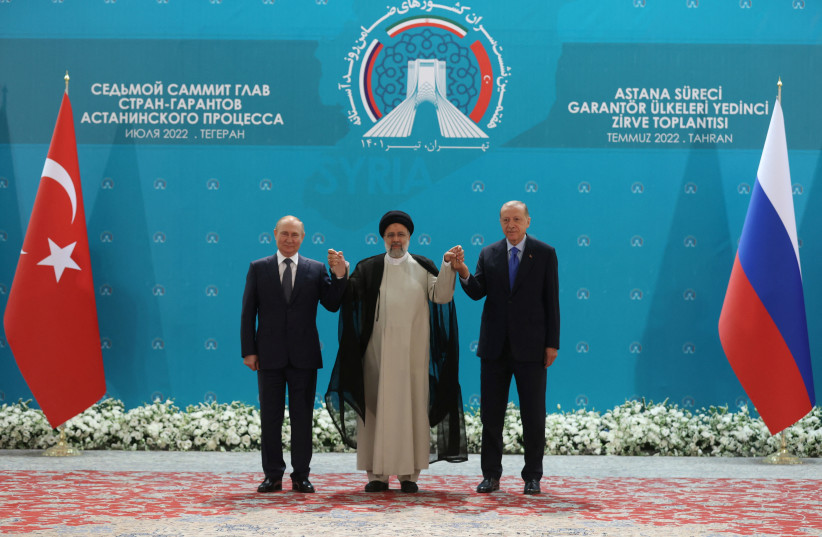The tripartite meeting in Tehran last week of Russia, Iran and Turkey has caused reverberations around the region – and may have global ramifications due to the mutual interest of the three authoritarian nations in undermining US hegemony.
These states have said openly that their goal is a multi-polar world, each of them with its own agenda and interests. It is worth reviewing briefly some of the outcomes of the get-together.
One potential impact is that the meeting of the three countries may empower China to pressure the United States.
Beijing has its own reasons to want to challenge the US, but as China watches Turkey, Russia and Iran working together, it may decide that it has new opportunities. Beijing knows that Washington can only deal with so many crises at the same time.
One issue where China is exploiting global tensions is in its reaction to the potential visit of a US delegation to Taiwan, including House Speaker Nancy Pelosi, and American military support for Taipei City.

“We made clear China’s stern position on the latest US proposed arms sale to Taiwan” Chinese authorities said, reiterating “that China firmly opposes and strongly condemns this. We have made serious démarches to the US side over this.”
Both the US and China are making advances in hypersonic missiles, and news on that subject has been broken in the last week by both countries.
Iraq has also paid grievously for the Iran-Turkey-Russia meeting. Ankara bombarded northern Iraq in the wake of the meeting, killing members of an Iraqi tour group.
Although the Kurdistan region has been victimized for years by Turkey’s growing military role in northern Iraq, the bombardment of civilian tourists from central Iraq who were in the northern Kurdish region – leading to the killing of entire families – is a new escalation by Ankara. It could be that Turkey has a blank check from Russia and Iran to carry out more attacks in Syria and Iraq in the wake of the Tehran meeting.
The Kurdistan region is also in a dispute with Baghdad about oil revenues. Considering the global energy crisis, caused in part by the Ukraine war, there are implications for this dispute as Moscow’s Gazprom energy giant signed a new deal with Iran last week.
FOLLOWING THE meeting, Tehran also said that the security of its neighbors was part of the security of Iran. This thinly veiled threat meant that Iran sees Iraq as its “near abroad” and that it will seek to defend Iraq from meddling by other countries.
Iran also said that those countries in the region who help its “enemies” would be punished. This was a threat to the Gulf countries that have relations with Israel.
After Iran, Turkey and Russia discussed their respective roles in Syria, the Damascus regime put out a statement saying that Syria must control all the borders of its nation.
Damascus wants Washington to leave eastern Syria. Turkey is demanding a new invasion into Syria that could potentially target the US-backed SDF. Together, it appears that the Syrian regime is taking a signal from Russia and Iran on its new efforts to dislodge the US. This could have major ramifications if Damascus, Russia and Iran (and even Turkey) work together toward this goal.
Damascus complained of airstrikes on Friday, and may see them as sending a message. Syria has long allowed Iran to entrench itself there and allow it to threaten Israel. The regime may be emboldened by the Tehran summit.
Russian President Vladimir Putin also gave a speech after his meetings in Tehran, saying that the West did not offer the world a vision of the future. This kind of language is designed to cater to his friends in China, Iran, Turkey and the Global South.
As if to coincide with these comments, Russia’s Foreign Ministry has indicated that the war in Ukraine could expand. While Moscow and Kyiv appeared to agree to some kind of a deal on grain exports, enabling Turkey to broker the trade, Russia also continue to bombard Ukraine.
It seems that Turkey playing a broker role in letting Ukraine sell its own grain is part of how it may be working together with Russia and Iran. Moscow also wants to acquire Iranian drones to use against Ukraine.
Washington must wonder whether the Iran meeting will have repercussions for any kind of Iran nuclear deal. Tehran appears to be mocking the West regarding the continued discussions about its nuclear commitments.
In addition, Iranian media began to slam NATO more strongly following the meetings with Russia and Turkey. This is a new kind of narrative for the Islamic Republic, which is now taking Moscow’s line more sharply and agreeing to Russia’s demands.
